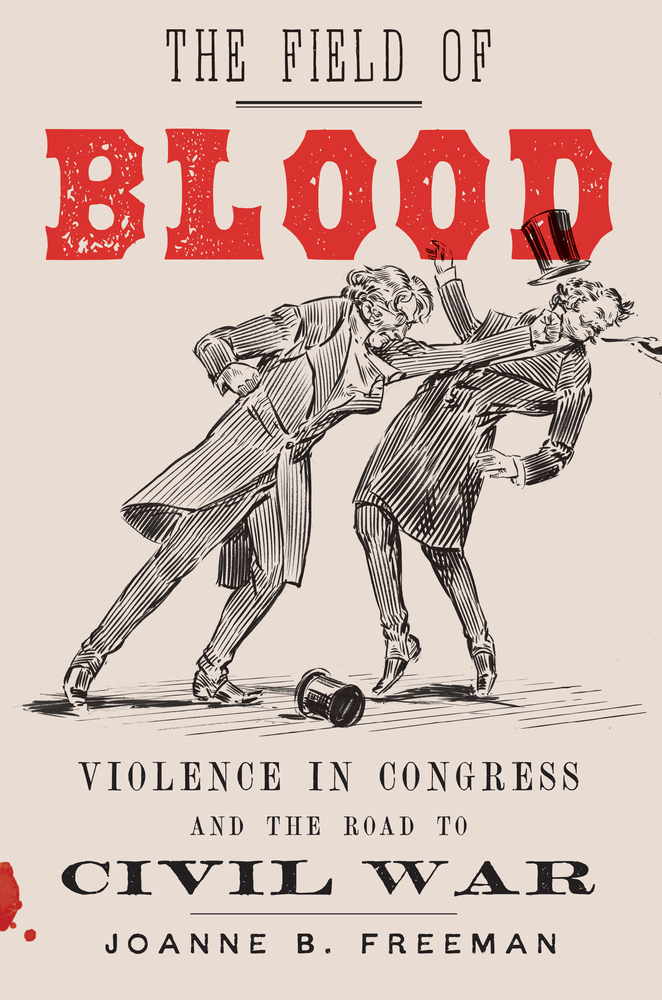Professor Joanne Freeman (Pomona `84):
The book on violence in the antebellum Congress:

The title comes from this line, which provides the book's epigraph: In a letter to Senator Charles Sumner (MA) Rev. John Turner Sargent wrote that "blood would flow—somebody’s blood, either yours or Wilson’s, or Hale’s, or Giddings’— before the expiration of your present session on that field of blood, the floor of Congress.”
Sargent was alluding to the burial place of Judas: "And the chief priests took the silver pieces, and said, It is not lawful for to put them into the treasury, because it is the price of blood. And they took counsel, and bought with them the potter's field, to bury strangers in. Wherefore that field was called, The field of blood, unto this day" (Matthew 27:6-8 KJV)
It was literally an atmosphere conducive to violence:
All this in a room that was hot, stuffy, and smelly. At the end of a typical day, with the galleries full and hours of body heat trapped in the chamber, French thought that reading aloud to members was like reading “with his head stuck into an oven.” When the House moved to larger windowless quarters in 1857, the acoustics improved but the air didn’t. This wasn’t just a matter of cigar smoke, whiskey fumes, and body odor. A series of climate studies revealed the scope of the problem: no air was circulating in the chamber, and the wisp of a draft that rose through the floor grates had to pass through a layer of “lint, dirt, tobacco quids, expectoration, and filth of every sort.” One member claimed that the “confined and poisonous” air had caused “much sickness and even several deaths,” and indeed, a handful of congressmen died during an average session, though not necessarily because of the air. Ongoing whimpering from the floor produced another study, this one demonstrating that it was thirty degrees warmer inside than outside and that the chamber smelled of sewage from the basement. Visiting the new chamber not long after it opened, French wasn’t impressed. The idea of “shutting up a thousand or two people in a kind of cellar, where none of God’s direct light or air can come in to them . . . does not jump with my notions of living,” he groused. Thirty years later, members still declared the House “the worst ventilated building on the continent."
Why did JFK focus on a Missouri senator? Perhaps because Missouri was a swing state. In 1960, he would carry it by less than a point, 50.3% to 49.7% for Nixon.
Thomas Hart Benton and pistols in the Senate
"Mr. Foote, who occupies a seat on the outer circle, in front of the Vice President's chair, retreated backwards down the aisle, towards the chair of the Vice President, with a pistol in his hand...
"In a moment almost every Senator was on his feet, and calls to order;" demands for the Sergeant-at-Arms; requests that Senators would take their seats, from the Chair and from Individual Senators were repeatedly made. Mr. Benton was followed and arrested by Mr. Dodge of Wisconsin, and, in the confusion and excitement which prevailed, he was heard to exclaim, from time to time: "I have no pistols!" "Let him fire!" "Stand out of the way!" "I have no pistols" "I disdain to carry arms!" "Stand out of the way, and let the assassin fire!"
"While making these exclamations, Mr. Benton was brought back to his seat; but breaking away from Mr. Dodge, of Wisconsin, who sought forcibly to detain him, advanced again towards Mr. Foote, who stood near the Vice President's chair, on the right-hand side, surrounded by a number of Senators, and others not members of the Senate. Mr. Dickinson took the pistol from the hand of Mr. Foote and locked it up in his desk, and Mr. Foote, on the advice of Mr. Butler, returned to his seat."
In 1856, Senator Sumner delivered his famous "Crime Against Kansas" speech. He attacked the absent Andrew Butler (SC), saying he had " a mistress . . . who, though ugly to others, is always lovely to him; though polluted in the sight of the world, is chaste in his sight—I mean," the harlot, Slavery."
Two days later, Butler's cousin, Representative Preston Brooks of South Carolina, responded:

You can see the cane in a Boston museum:
Lincoln-Douglas debates
Sam Houston:
- Was once a House member from Tennessee;
- In 1832, caned Rep. William Stanbery of Ohio;
- As a senator from Texas, was the sole Southern Democrat to vote against the Kansas-Nebraska Act.
- On the eve of the Civil War, won the Texas governorship but refused to take an oath to the Confederacy.
Congress and the Civil War
The congressional oath of office dates from this era.
Background on the impeachment process.
There is an entire site on the Johnson impeachment.
See the Tenth Article of Impeachment:
[Johnson did] make and deliver with a loud voice certain intemperate, inflammatory and scandalous harangues, and did therein utter loud threats and bitter menaces as well against Congress as the laws of the United States duly enacted thereby, amid the cries jeers and laughter of the multitudes then assembled and in hearing ... Which said utterances, declarations, threats, and harangues, highly censurable in any, are peculiarly indecent and unbecoming in the Chief Magistrate of the United States, by means whereof said Andrew Johnson has brought to high office of the President of the United States into contempt, ridicule, and disgrace, to the great scandal of all good citizens, whereby said Andrew Johnson, President of the United States, did commit, and was then and there guilty of a high misdemeanor in office.JFK's account:
- Airbrushes Andrew Johnson, who opposed secession but not for reasons of human rights: "Damn the negroes. I am fighting those traitorous aristocrats, their masters."
- Overlooks the possibility of bribery
Lucius Lamar

No comments:
Post a Comment